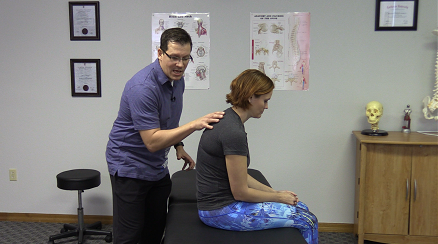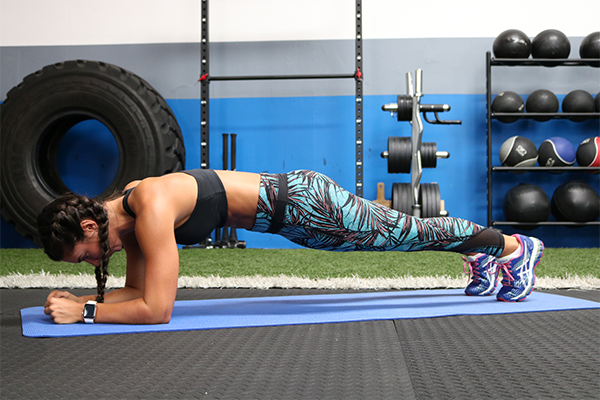I’ll confess up front: I have some pretty bad posture.
But I know I need to work on it and I do (I really do) make an effort in trying to stay in perfect alignment in all that I do. It’s been bad ever since I was in high school and most likely even longer than that.
Having good posture is one of those things that everyone keeps in the back of their mind as something they know they should have but never get around to working on. Kind of like eating more vegetables and saving more money.
It is estimated that 66% to 90% of people suffer from forward head posture. The chances are very good that you suffer from it as well, just like I do. (Griegel-Morris 1992)
Even as I’m sitting here writing this to you I keep forcing myself to adjust my body in my seat. It’s amazing how quickly things change just by simply scooting your butt back in your chair and sitting up tall.
And it’s amazing how quickly the body deteriorates by not adjusting your posture and falling into the slouched position forcing the head to extend further than it should.
So let’s look at the many ways posture impacts the musculoskeletal and neural systems within the body:

Appearance
We ALL care about how we look and to some even more important is how we look to each other. Appearance is the very first thing people measure when first meeting someone, interviewing for a job or going out on a date.
Just by standing or sitting up straight, you change your appearance to one of instant confidence and security. It is impossible to feel low or sad when you are upright and smiling. Think of those in royalty, those on the silver screen, and those divas gracefully walking the catwalk. These talented individuals are boasting long lean necklines, head held straight, shoulders square, not shrugging up or slumped down.
You will portray confidence and enthusiasm that is very VERY attractive to a large number of people. Slouch, slump and frown and see how you look – disheartened, bored, tired, old and fat.
Forward Head Posture or ‘turtle neck’ as some call it will quickly rob you of your height up to two inches and add you’ll look 5-10 pounds heavier than you are. If you’re slouched over with your head in a forward position, your appearance is instantly affected negatively.
What’s more appealing to you, one who is slouched over in a closed off position or one who is standing tall with a sense of confidence in how they look? That’s a no brainer. Everyone should agree on that one.
Hormone Regulation
A 2010 study that Dana Carney, a social psychologist at UC Berkeley, co-authored a study that was among the first to demonstrate a link between body positioning and brain chemistry. It showed that when people took on “power poses” – standing in various postures reflecting confidence (chest up, shoulders back, head raised), regardless of whether they felt confident – it increased levels of testosterone and lowered levels of cortisol in the brain.
And as you may or may not know, testosterone is a hormone associated with self-confidence, the development of male reproductive tissue, as well as promoting secondary sexual characteristics such as increased muscle mass and bone density.
Whereas cortisol is often referred to as the “stress hormone”, which has been linked to rapid and unwanted fat gain.
Interestingly enough, by moving from a head forward posture into a powerful and strong posture (as seen in the comparison pictures below) for 2 minutes can increase testosterone levels by 20% and decrease cortisol levels by 25%. (Carney 2010)
Breathing
Forward Head Posture or (FHP for short) in particular has been shown to lead to a decrease in the strength in the muscles involved in the breathing process which will decrease your breathing and can reduce your lung capacity by 30% (Kapreli 2009) (Dimitriadis 2013).
A head forward posture leads to a decrease in cervical lordosis which blocks the action of the hyoid muscles, especially the inferior hyoid, which is responsible for lifting the first rib during inhalation.

FHP can also lead to the blocking of your airway while you sleep leading to a decrease in oxygen to your brain when sleeping and a decrease in the quality of your sleep overall. (Ozbek 1998).
When the airway is blocked or obstructed, snoring and noisy mouth breathing will occur and the statistics for this problem are widespread and alarming. Approximately 45% of the population snore and 1 in 4 people are habitual snorers.
This of course can be caused from multiple things like smoking, drinking alcohol, excessive body weight among other things but ultimately it’s due to the tissues and muscles in and around the throat area breaking down and/or failing.
As previously mentioned, having forward head posture creates an imbalance in the muscles surrounding the throat and this can lead to a poor or obstructed airway inducing snoring or noisy mouth breathing.
Due to the misalignment of your head and torso, your airway can become blocked when you sleep which starves your brain of oxygen, severely disrupts sleep quality and leads to snoring.
Another common and very serious issue is sleep apnea. Sleep apnea is also caused from an obstructed airway but is the more severe breathing related issue compared to snoring and noisy mouth breathing.
With this disorder, the airway becomes so blocked that breathing is limited or stopped all together causing the individual to wake up gasping for air. This of course is a very frightening problem to have and it affects thousands of people all around the world.
All things considered, having a forward head posture can kill the quality of your sleep and you’re more likely to suffer from snoring, noisy mouth breathing and sleep apnea when you have FHP.
Without the rest you need your work, relationships and energy levels will be negatively affected.
Vigor and Alertness
Dutch behavioral scientist Erik Peper has put in extensive research into this area. He regularly makes participants in his lectures stand up and stretch all while maintaining a picture-perfect posture, for similar reasons why exercise has been linked to happiness, like here:
Here are three fascinating things that happened the instant our posture changes:
- When we sit up straight with our chin elevated and retracted inward, we are more likely to remember positive memories or think of something positive in general, according to Peper’s personal experiments.
- Recent research found that 92% of people found it easier to generate positive thoughts in an upright posture compared to a slouched posture. (Wilson 2004)
- Another insight was that if we move dynamically (skip, jump, run, etc.) during breaks, we can significantly increase our energy levels. A slow, slumped walk with rounded shoulders and a dropped head on the other hand (similar to texting while walking), can do the exact opposite and drain us of our energy.

So How does this happen? Why does a forward head with rounded shoulders affect us so much?
When the head is forward over the spine, the brain may not be receiving sufficient blood flow, nerve impulses, and oxygen due to compression of the carotid arteries and surrounding nerve endings.
If this compression is severe enough, it can result in a central nervous system dysfunction. And the scary part is that it doesn’t take much to cause a restriction within this part of the body.
As is always the case with the body, when one link in the chain is broken or damaged, the strength of the whole chain is weakened. FHP not only negatively impacts appearance, hormone regulation, breathing and energy, it also can be linked to digestive issues, harmful effects on your vision and hearing, decrease your range of motion and even cause dizziness and balance issues.
Take This Quick Self-Test To See If You
Have Forward Head Posture
by Brian Klepacki, MS, CSCS, CISSN, FMS






